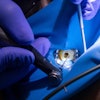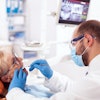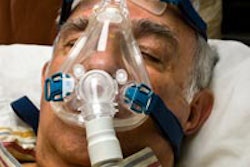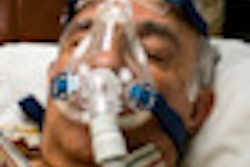Obstructive sleep apnea may cause changes in blood vessel function that reduce blood supply to the heart in people who are otherwise healthy, according to new research reported in Hypertension, the journal of the American Heart Association (AHA).
However, treatment with 26 weeks of continuous positive airway pressure (CPAP) improved study participants' blood supply and function, according to the study authors.
Obstructive sleep apnea affects about 15 million adults in the U.S. and may be a contributing factor to high blood pressure and cardiovascular diseases, according to the AHA.
"The findings should change how doctors treat patients with obstructive sleep apnea," stated lead author Gregory Lip, MD, a professor of cardiovascular medicine at the University of Birmingham in the U.K. in a news release. "Even apparently healthy patients with sleep apnea show abnormalities of small and large blood vessels, as well as impaired blood supply to the heart muscle, and these can improve with CPAP therapy."
CPAP treatment provides a constant airflow that holds the airway open to maintain uninterrupted breathing during sleep. This eliminates sleep apnea events and allows the patient to sleep.
The study is the first to show blood vessel abnormalities in sleep apnea patients, the authors noted. Previous studies have linked blood vessel dysfunction to cardiovascular disorders.
Reversing blood vessel abnormalities could help patients with obstructive sleep apnea who are otherwise healthy avoid developing and dying from cardiovascular disorders, the researchers said.
They looked for changes in blood vessel function in 108 participants who were otherwise healthy, with no differences in age, sex, body mass index, and smoking status across three groups:
- 36 people with moderate or severe obstructive sleep apnea without high blood pressure
- 36 high blood pressure patients without obstructive sleep apnea
- 36 patients with neither high blood pressure nor obstructive sleep apnea
Researchers used several techniques to assess blood vessel function, including myocardial contrast echocardiography to check the blood supply to the heart muscle.
All the sleep apnea patients received CPAP therapy, so proper randomized studies will still be needed to confirm the intervention's beneficial effects on the blood vessels, Dr. Lip noted. Furthermore, patients in the control groups weren't treated with CPAP therapy, which would have been clinically unjustified because none had obstructive sleep apnea.
Dr. Lip hopes his research will bring greater awareness to the relationship between obstructive sleep apnea and cardiovascular diseases. "The condition can be treated, and it is important that clinicians look out for it," he said.
The study was partially funded by Bracco Research.



















